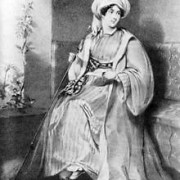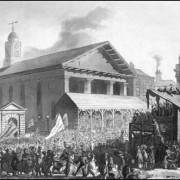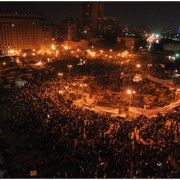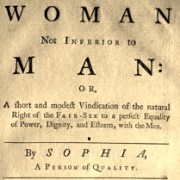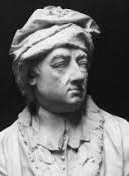MONTHLY BLOG 26, WORST AND BEST ACADEMIC LECTURES THAT I’VE HEARD
If citing, please kindly acknowledge copyright © Penelope J. Corfield (2013)
Apart from the routine lectures that form the bread-and-butter of an academic’s job, we constantly give special lectures and/or papers. These presentations are made to a miscellany of research seminars, public meetings, specialist societies, academic conferences and other outlets, at home and overseas. From the early 1970s onwards my private log tells me that I’ve given almost 300 of these extra performances.
At the same time, I am a seasoned listener to presentations from fellow academics. During my career, I must have heard many thousands. Trained by my incisive supervisor to have a critical response up my sleeve, I decided early on always to ask a question. Which I do – almost invariably, provided that the event allows for audience participation. Preparing a range of potential questions, from a dolly to an underwater torpedo, keeps the mind focused. It’s not hard to respond to a good paper. But what’s the best way to critique a dull or weak or off-beam interpretation, without being rude or dismissive? It’s a good challenge.
Over time, the standard of papers and lectures has undoubtedly risen. People are more professional and time-keeping is much more reliable. There are things that still could get better. Talking from notes (but not reciting a list of points on a screen) is much more engaging for the audience than reading aloud from a prepared script. William Hogarth long ago indicated how boring a droned lecture-from-text can be.
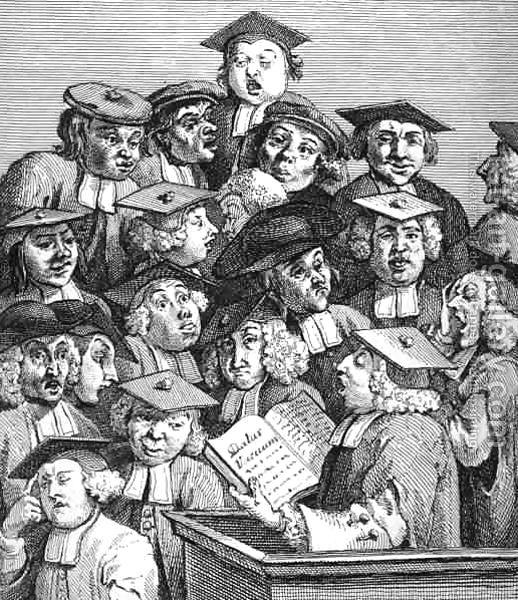
|
William Hogarth’s Scholars at a Lecture, 1736 |
On the other hand, it can be hard for beginner-historians to manage without a script. They generally have to convey a great deal of factual information and quotations, which have to be accurate. So there is scope for progression. I usually recommend starting with full scripts but then, with greater experience, expanding the amount of free-speaking.
Ultimately, however, it’s not the style of an exposition but the content that counts. The two worst presentations were similar in format and outcome. Both were intended sincerely, by speakers who were so entranced by their material that they had lost sight of the need to explain it.
One was a seminar paper, given by an eminent professor of eighteenth-century political history, who decided to branch out into the history of political thought. As a first foray, it was not a success. Announced as ‘The Debate between Edmund Burke’s Conservatism and Thomas Paine’s Radicalism’, Professor Ian Christie itemised at length the differing views of these two hegemonic political thinkers. His conclusion was unequivocal. It consisted of the simple observation: ‘Well, there you are! Burke was right’. A deep silence fell. I felt very sorry for the chair. We struggled to coax a debate from the speaker. But he merely replied: ‘Well, you’ve heard Burke’s views’. The unsatisfactory session drew to an early close. Alone among those present, the speaker remained serenely happy.1
A second dreadful session was of the same ilk. A famously combative professor of the fifteenth-century English economy offered a seminar paper on ‘Continuity in History’. The title was one that I found especially attractive, since I love macro-sweep. Obviously others agreed, because crowds assembled. Tony Bridbury’s paper, however, consisted of a close exposition of the fifteenth-century history of the Paston family, buttressed by readings from the well-known Paston Letters.2 There were no new insights. We were supposed to understand that family life and the small concerns of daily existence are universal preoccupations. Even that point, however, was not stated explicitly. Nor was there any conclusion, other than a gleeful: ‘You see? Nothing changes’. The following discussion spluttered briefly but got nowhere.
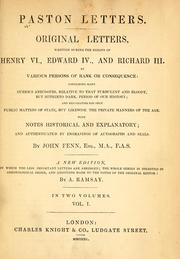
| A first select edition of the Paston Letters was published by John Fenn in 1787, with new edn by A. Ramsay (1849) |
Was there anything that the seminar chairs could have done to retrieve these situations? Perhaps they might have organised rival groups from the audience, to argue the respective cases for and against the core propositions. That manoeuvre would have been possible in an established class, where the course director has more control over the format. In a seminar, with a changing attendance from session to session, it would have been more tricky. But worth a try. Certainly more positive than the disgruntlement that actually prevailed.
Needless to say, the seminar/lecture norm has always been much better than either of those examples. And I have heard many very good and some completely outstanding presentations. How to pick one from the pack?
My choice is a master-exposition by the historian E.P. Thompson. His first degree was actually in English at Cambridge. On this occasion, he regaled an adult education conference in Preston with a lecture which combined the English-literary technique of close-reading with a historian’s detective work and attention to context. It showcased Thompson’s distinctive style at its very best.
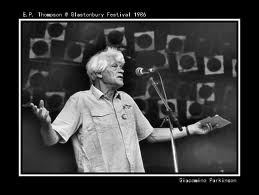
| E.P. Thompson at Glastonbury Festival 1986, by Giacomino Parkinson,from www.glastonburyfestivals.co.uk. |
In Preston, the lecture began with his quiet reading of a poem by William Blake: ‘The Garden of Love’ from The Songs of Experience.3 Thompson then launched into his analysis, entirely without notes. At the end, he recited the poem again, with added emphasis. The result was startling. In the second reading, all the meanings and allusions within the poem sprang intensely to life. It was like stepping from a monochrome world into a world of vivid colour. Whether his general exposition of Blake was sustainable remained to be tested when, later, Thompson published his Witness against the Beast: William Blake and the Moral Law.4 But, as a single lecture, it was exemplary in its entirely original mixture of literary detail and historical breadth.
The thirty-odd people who had assembled on a cold November afternoon in the mid-1980s for a routine local-history conference were challenged in true Blakeian style ‘to see the world in a grain of sand’. It was an inspiration that revealed what a great lecture can do.
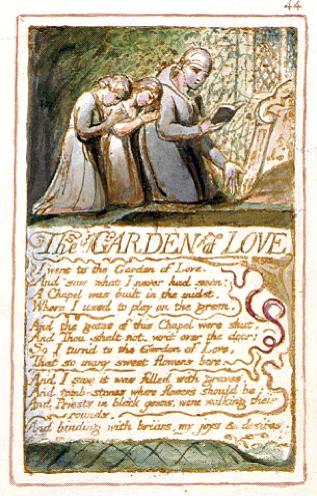
1 This session, chaired by John Dinwiddy, occurred in the later 1970s. Subsequently Ian Christie (1919-98) amplified his study of the ‘intellectual repulse of revolution’ in his Ford Lectures, published as I.R. Christie, Stress and Stability: Reflections on the British Avoidance of Revolution (Oxford, 1984).
2 This session, chaired by F.J. Fisher, occurred in the early 1970s. In other contexts, A.R. Bridbury (1924- ) was happy to detect change: see variously his Economic Growth: England in the Later Middle Ages (1962; reissued Brighton, 1975); The English Economy from Bede to the Reformation (Woodbridge, 1992); and his Medieval England: Its Social and Economic Origins and Development (Leicester, 2008).
3 W. Blake, ‘The Garden of Love’’, from his Songs of Experience (1794).
4 E.P. Thompson (1924-93), Witness against the Beast: William Blake and the Moral Law (Cambridge, 1993). For more on EPT and bibliographic references, see my earlier Blog/14, dated Dec. 2011.
For further discussion, see Twitter
To read other discussion-points, please click here
To download Monthly Blog 26 please click here

